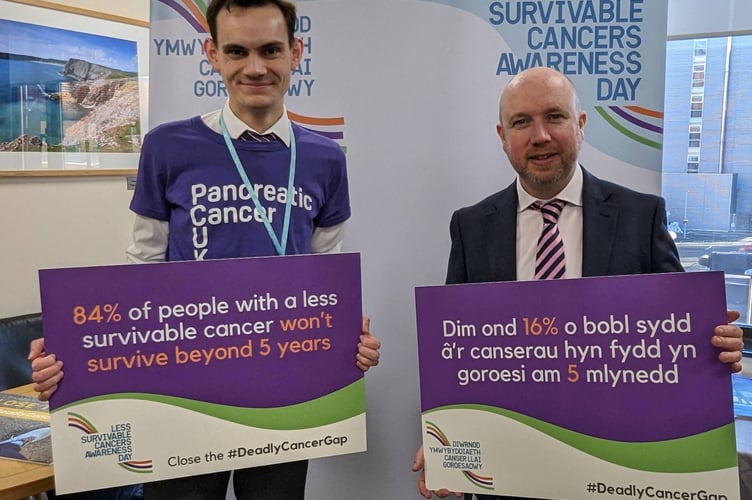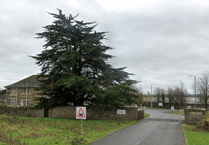The Welsh Government’s record on cancer survival rates is “abysmal,” according to North Wales MS Llŷr Gruffydd.
Mr Gruffydd was responding to new data that shows Wales lags woefully behind other countries when it comes to the survival of patients who have less survivable cancers. The figures were released by the Less Survivable Cancers Taskforce’s (LSCT) on Less Survivable Cancers Awareness Day 2024.
Mr Gruffydd is calling on Welsh Labour ministers to “act decisively” to improve the poor survival chances of people diagnosed with cancers of the lung, liver, brain, oesophagus, pancreas or stomach. The “worrying” figures are based on a new analysis of existing data and the world survival rankings of lung, liver, brain, oesophageal, pancreatic and stomach cancers. The data shows that out of 33 countries of comparable wealth and income levels, Wales ranks as low as 32nd for five year survival for stomach cancer and 31st for pancreatic and lung cancers. This rises to 21st for both liver cancer and oesophageal cancer and 12th for brain cancer.
Mr Gruffydd MS: “These worrying figures from the Less Survivable Cancers Taskforce highlight the abysmal record of the Welsh Government when it comes to Less Survivable Cancers. It extremely disappointing, but unfortunately unsurprising to see how poorly Wales, compares to our international counterparts.
“People diagnosed with one of these six cancers still have a shockingly low life expectancy and this is something that needs to change. Welsh Labour ministers need to act decisively to ensure that this happens. There are a range of actions that Welsh Government ministers could take to significantly improve survival rates. They include rolling out a programme that ensure that those most at risk are targeted for screening and monitoring.
“There have been repeated calls for improving targeted screening and monitoring which has fallen on deaf ears so far. These latest statistics should concentrate the minds of Welsh Government ministers on the importance of prioritising and accelerating cancer survival initiatives. Without concerted effort and action now, opportunities will continue to be missed to save lives.”
The countries with the highest five year survival rates for less survivable cancers were Korea, Belgium, USA, Australia and China. If people in the UK survived at the same rate as those in these countries, then over 8,000 lives could be saved annually. Currently in the UK around 15,400 people will survive for five years following a diagnosis of a less survivable cancer. If the UK had rates comparable to the top five countries, this number could be close to 24,000.
Dwyfor Meirionnydd MS Mabon ap Gwynfor also criticised the figures.

He said: "“All cancers combined continue to be the biggest killer in Wales, cutting precious lives short far too often. We all know someone who has or is suffering from cancer and too many of us know loved ones who have lost their lives to cancer. The earlier the diagnosis the better the chances of survival, therefore it continues to be a great source of frustration that no more is done to ensure that we take action to prevent cancer and diagnose it much earlier. I fully support the Less Survivable Cancers Taskforce and their calls to improve the currently terrible prospects for people diagnosed with these cancers.
“People diagnosed with one of these six cancers still have a shockingly low life expectancy. These newly released figures are concerning and it’s extremely disappointing to see how poorly Wales, and the UK, compares to our international counterparts.
“The actions we are calling for - targeted screening and monitoring those most at risk - would have a huge impact on survival.
“Without concerted effort and action, we will miss opportunities to save lives. We need the government recognise steps must be taken far earlier than when people are referred to hospital and actions must be taken to tackle the social cancer of chronic poverty if we are to successfully tackle cancers.”





Comments
This article has no comments yet. Be the first to leave a comment.